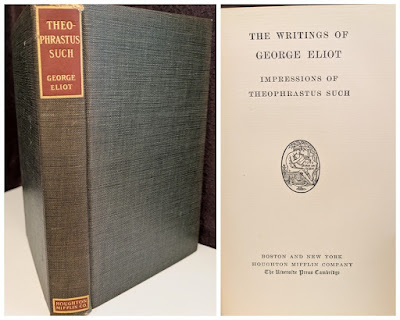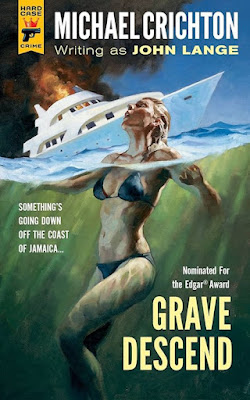For the May 2025 meeting, book collectors uncovered the writers behind their Pen Names. For various reasons, whether personal or professional, writers have adopted a nom de plume (or nom de guerre), a pseudonym, a pen name, or even an entire identity with which to publish their works.
The books are shown here in chronological order of the birth
year of the author.
George Eliot (Mary Ann Evans)
 |
| Impressions of Theophrastus Such |
Eliot, George. Impressions of Theophrastus Such. Boston: Houghton Mifflin Company, 1908. Theophrastus Such was Eliot's last published writing, originally published in 1879, the year before her death. George Eliot was born Mary Ann Evans but changed her name when she moved in with George Lewes, her long-time companion; they considered themselves married though Lewes was legally married to another woman.
Lewis Carroll (Charles Lutwidge Dodgson)
 |
| Alice's Adventures in Wonderland |
Carroll, Lewis. Alice's Adventures in Wonderland. New York: The Limited Editions Club, 1932. Limited edition. Alice's Adventures in Wonderland was first published in 1865. Charles Lutwidge Dodgson first published as Lewis Carroll in 1856, using a pseudonym selected by his editor from among four names Dodgson suggested. The pseudonym was a play on his real name; Dodgson translated "Charles Lutwidge" to Latin as "Carolus Ludovicus," which he anglicized as "Carroll Lewis" and then reversed to "Lewis Carroll."
 |
| Signed by Alice! |
This copy is #1118 of 1500 numbered copies signed by the binder, Frederic Warde. This copy is further signed on a blank preliminary page by Alice Hargreaves, the real Alice for whom the eponymous character is named. Alice Hargreaves (nee Liddell) was one of the daughters of Henry Liddell, a friend of Dodgson.
 |
| The Russian Journal |
Carroll, Lewis. The Russian Journal and Other Selections from the Works of Lewis Carroll. New York: E. P. Dutton & Co., Inc., 1935. Edited and with an introduction by John Francis McDermott. Lewis Carroll was the pen name used for Dodgson's fiction; he maintained his given name for his scholarly writing.
Mark Twain (Samuel Langhorne Clemens)
 |
| Following the Equator |
Twain, Mark. Following the Equator: A Journey Around the World. Hartford, CT: American Publishing Group, 1897. First edition. Following the Equator is a travelogue and social commentary by Samuel Clemens, better known by his primary pen name, Mark Twain. Clemens claims to have taken the pen name from a riverboat captain, Isaiah Sellers, who used Mark Twain as his nom de guerre for Mississippi River news published in the New Orleans Picayune. As a nautical term, "mark twain" refers to two marks—"twain" being an archaic term for "two"—on a sounding line, indicating a water depth of two fathoms (12 feet); "mark twain" was called out by riverboatmen to inform the pilot that the water was deep enough for the vessel to pass safely.
Isak Dinesen (Karen Blixen)
 |
| Last Tales |
Dinesen, Isak. Last Tales. New York: Random House, 1957. First edition. Karen Blixen, formally Baroness Karen Christentze von Blixen-Finecke (nee Dinesen), a Danish writer, used the pen name Isak Dinesen in English-speaking countries and Tania Blixen in German-speaking countries. In Danish, she also published as Osceola and Pierre Andrézel.
N. W. Clerk (C. S. Lewis)
 |
| A Grief Observed |
Lewis, C. S. A Greif Observed. Greenwich, CT: The Seabury Press, 1963. A Grief Observed was first published in 1961 under the pseudonym N. W. Clerk. The book is a memoir of Clive Staples Lewis's bereavement following the death of his wife, Joy Davidman. He wanted to explore his grief but also avoid any connection to his religious writing. To further maintain anonymity, N. W. Clerk referred to his wife in the book only by the letter H (the initial of Joy's first name, Helen). A Grief Observed was republished under C. S. Lewis's own name after his death in 1963, though the publisher maintained the original text only referring to Lewis's wife as "H."
Sheila Cousins (Ronald Matthews)
 |
| To Beg I Am Ashamed |
Cousins, Sheila. To Beg I Am Ashamed: The Autobiography of a London Prostitute. Paris: The Obelisk Press, 1938. Only authorized edition, complete and unexpurgated. Sheila Cousins is the supposed pseudonym of a London prostitute, but is, in fact, a pen name for Ronald Matthews, a British journalist. There is no evidence the author ("Cousins") is a real person or the autobiography is authentic, despite the author’s and publisher’s claims. It is most likely a work of fiction, even though Matthews claimed to have ghostwritten the book for a real prostitute. Matthews was a friend of Graham Greene and sent Greene the manuscript for some friendly criticism; Greene’s response was far from friendly, but he did rewrite several passages throughout the narrative, encouraging Matthews to imitate his more descriptive style. Matthews incorporated Greene's revisions but made no other changes to his rather dry prose (a polite way to describe it!). As a result, Greene is often mistakenly attributed as a co-ghostwriter with Matthews.
 |
| with original wraparound band |
The book was originally published by George Routledge & Sons but was immediately attacked by the Public Morality Council and denounced by The Daily Mail. The Home Office, the UK's interior ministry, sent police to Routledge's office and the publisher withdrew the book from publication. Three months later, in June 1938, Obelisk Press, an English language press based in Paris, France—and a frequent publisher of banned and censored books—released the book, publishing it beyond the reach of the British government. This copy is a first printing of the first edition published by Obilesk Press and retains the rare original wraparound band.
George Orwell (Eric Arthur Blair)
 |
| Animal Farm |
Orwell, George. Animal Farm. New York: Berkley, 2020. 75th anniversary authorized edition, with a foreword by Ann Patchett and a new introduction by Tea Obreth. Animal Farm was first published in 1945 by George Orwell, the pen name for Eric Arthur Blair. He wanted to publish under a different name to avoid embarrassing his family because of his "tramp" lifestyle. He settled on the name George Orwell saying, "it is a good round English name," with George inspired by the patron saint of England and Orwell after the river in Suffolk, one of his favorite locations.
Ogdred Weary (Edward Gorey)
 |
| The Curious Sofa |
Weary, Ogdred. The Curious Sofa: A Pornographic Work. New York: Ivan Obolensky, Inc., 1961. This is a first and numbered, limited edition, of which all copies are numbered 83 of 212. Ogdred Weary was the most used of several anagram pen names used by Edward Gorey. Gorey enjoyed word games, such as anagrams, and he released books under other anagram names including E. G. Deadworry, D. Awdrey-Gore, Wardore Edgy, and Mrs. Regera Dowdy. As another type of word play, Gorey published several books as Eduard Blutig, with "Blutig" being the German word for "bloody" or "gory."
Jeffrey Hudson and John Lange (Michael Crichton)
 |
| A Case of Need |
Hudson, Jeffrey. A Case of Need. New York: New American Library, 1968. First edition. Michael Crichton published his fourth novel, A Case of Need, a medical thriller, under the pen name Jeffrey Hudson. The name is a reference to Sir Jeffrey Hudson, a 17th century dwarf in the queen consort's court, and an ironic nod to his self-described "abnormal" height of 6' 9".
 |
| Easy Go |
Lange, John. Easy Go. New York: Hardcase Crime, 2013. Easy Go was first published by Signet in 1968; it was the third novel by Michael Crichton published as John Lange. The name is a nod to Andrew Lang, a cultural anthropologist. Crighton began writing as John Lange while in medical school to separate his writing from his planned medical career.
 |
| Grave Descend |
Lange, John. Grave Descend. New York: Hardcase Crime, 2013. Grave Descend was first published by Signet in 1970. It was the seventh of eight John Lange novels authored by Crichton.
 |
| John Lange titles |
Other Crighton stories published as John Lange include Odds On (1966), Scratch One (1967), Zero Cool (1969), The Venom Business (1969), Drug of Choice (1970), and Binary (1972).
Leigh Nichols (Dean Koontz)
 |
| The House of Thunder |
Nichols, Leigh. The House of Thunder. New York: Pocket Books, 1982. First edition. Leigh Nichols is one of several pen names used by Dean Koontz. The House of Thunder is the fourth of seven Leigh Nichols books authored by Koontz.
 |
| The House of Thunder |
Koontz, Dean (writing as Leigh Nichols). The House of Thunder. Arlington Heights, IL: Dark Harvest, 1988. Limited edition. This copy is #259 of 550 signed and numbered copies.
Michael Clynes, Paul Harding, and C. L. Grace (Paul Doherty)
 |
| The Death of a King |
Doherty, P. C. The Death of a King: A Medieval Mystery. New York: St. Martin's Press, 1985. First edition. Paul Charles Dominic Doherty is an English author who writes both fiction and non-fiction under his own name, as well as under the pen names Michael Clynes, Paul Harding, C. L. Grace, Anna Apostolou, Ann Dukthas, and Vanessa Alexander.
 |
| The White Rose Murders |
Clynes, Michael. The White Rose Murders. New York: St. Martin's Press, 1991. First edition.
 |
| Red Slayer |
Harding, Paul. Red Slayer. New York: William Morrow and Company, 1992. First edition. Also titled The House of the Red Slayer.
 |
| A Shrine of Murders |
Grace, C. L. A Shrine of Murders. New York: St. Martin's Press, 1993. First edition.
John Reid (Andrew Tobias)
 |
| The Best Little Boy in the World and The Best Little Boy in the World Grows Up |
Reid, John. The Best Little Boy in the World. New York: Ballantine Books, 1993. The Best Little Boy in the World, a memoir, was first published pseudonymously in 1973, when the author did not feel safe publishing his account of growing up gay in America under his own name. Twenty-five years later, John Reid revealed himself as Andrew Tobias.
Tobias, Andrew. The
Best Little Boy in the World Grows Up.
New York: Ballantine Books, 1999. Twenty-five years after the publication of his
now-classic memoir, Tobias reflects on the writing and publication process, and
how the book’s reception shaped the life of the anonymous author. The memoir was released the same year Tobias
was elected treasurer of the Democratic National Committee, a role he held
until 2017.
Lemony Snicket (Daniel Handler)
 |
| The Bad Beginning |
Snicket, Lemony. The Bad Beginning. New York: Harper Collins, 2003. Lemony Snicket is both the "in-universe" author and a fictional character in A Series of Unfortunate Events, of which there are 13 books written by Daniel Handler. Snicket is a mysterious, omniscient narrator who self-inserts himself into the lives of the central characters to chronicle their misfortunes.
Christina Lauren (Christina Hobbs and Lauren Billings Luhrs)
 |
| Autoboyography |
Lauren, Christina. Autoboyography. New York: Simon & Schuster, 2017. First edition. Christina Lauren is the pen name for the writing duo Christina Hobbs and Lauren Billings Luhrs. They met in 2009 while writing online fan fiction. They became co-authors in 2010 and published their first book in 2013. As Christina Lauren, they have authored 34 books of teen fiction and romance novels.



